- Beranda
- Komunitas
- News
- Berita dan Politik
West Papuan women 'can't keep silent' about the 'torture, inhumane killing'
TS
mabdulkarim
West Papuan women 'can't keep silent' about the 'torture, inhumane killing'
West Papuan women 'can't keep silent' about the 'torture, inhumane killing' in their country
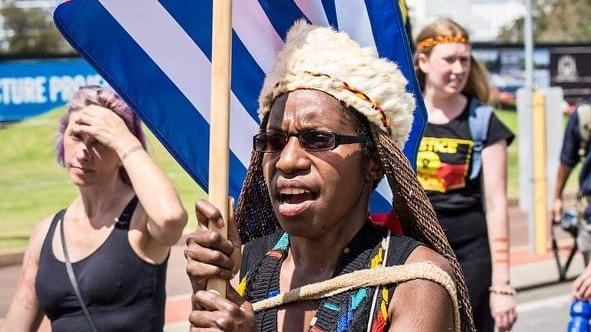
On the streets of Perth, almost 4,000 kilometres from West Papua, Wiwince Pigome raises the Morning Star flag.
In doing so, she renews a decades-long push for independence from Indonesia.
Key points:
>West Papuan women exiled in Australia are renewing a push for independence from Indonesia
>West Papua was incorporated into Indonesia in 1962
>Thousands have been killed and displaced amid violent clashes over the past 60 years
Hilda Wayne explores the impact of this violence on the women of West Papua and hears from those leading the fight for independence.
Ms Pigome is one of a number of women who fled overseas in the wake of escalating violence, killings and the widespread displacement of her people.
"I sometimes feel guilty because my people, my family back home is not safe, it is safer with the life that I'm having in Australia," she said.
"[The Indonesian military] is going into war against these poor civilians without arms simply because they want to take over West Papua.
"People have to leave their own home and villages and become refugees in nearby jungles, without any support."
Ms Pigome said people in the eastern Indonesian provinces of Papua and West Papua were living in precarious conditions after the 2018 massacre in Nduga and a violent uprising in Wamena in 2019.
"Military take over our schools, hospitals, community halls and churches and turn them into military bases and [they] burned down all the village houses, killing their animals," she said.
"Many of my family, West Papuans, is living in trauma because of this.
"And then there is no international support or attention, especially when our own people become asylum seekers in in our own homes."
West Papuan women are now empowering themselves and giving a voice to Papuans amid media blackouts.
Life in West Papua
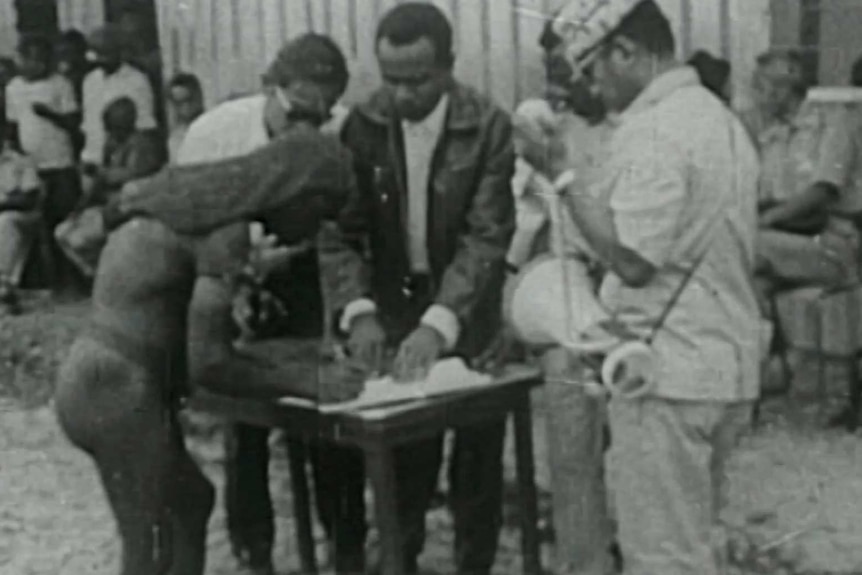
Only 1,025 Papuans voted in the 1969 referendum. Many felt the vote was unjust.
Tensions between Papuans and Indonesia's military have been simmering for 60 years, after the Dutch handed control of West Papua to Indonesia in 1962 before a disputed referendum.
In 1969, a mere 1,025 hand-picked Papuans voted in the United Nations-backed Act of Free Choice poll. Unsurprisingly, the majority chose to remain part of Indonesia.
What followed was a controversial program called Transmigrasi, which involved permanently moving people from densely populated areas of Java to sparsely populated regions such as Papua.
With an aim to reduce poverty in overpopulated cities and exploit the region's natural resources to create jobs, Papuans were marginalised and dispossessed of their traditional lands, which continues to fuel anger over Indonesia's rule today.
And it radically changed the region's demographics, with Papuans being a minority group in several areas, outnumbered mostly by Javanese Indonesians.
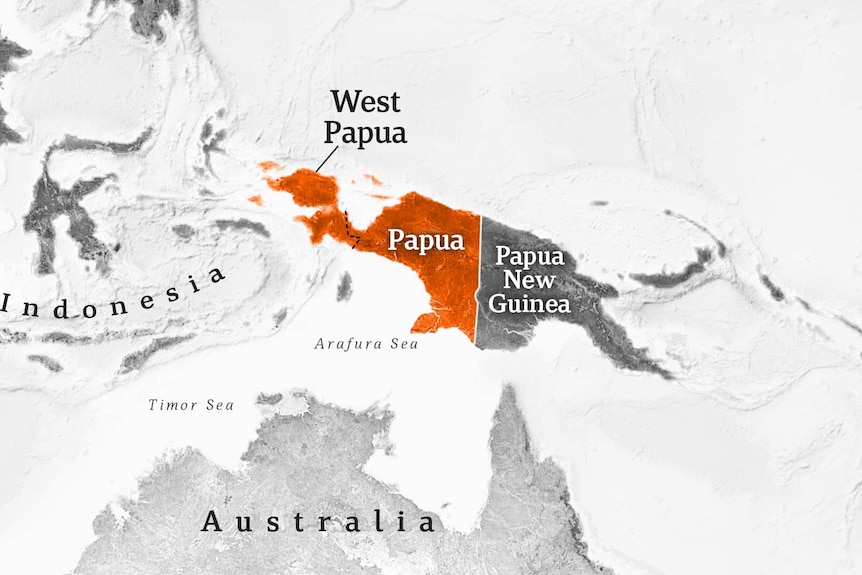
The Indonesian provinces of West Papua and Papua. (ABC News: Jarrod Fankhauser)
'We can't keep silent'
Over the past 60 years, calls for independence have had deadly consequences.
Australia has been hesitant to intervene in West Papua's human rights crisis, mainly due to its relationship with Indonesia.
In 2006, Australia signed the Lombok Treaty, which recognised Indonesia's territorial sovereignty over the region and involved a commitment by both countries to not support "groups encouraging separatism".

It is estimated that between 100,000 and 500,000 people have been killed in violent clashes between pro-independence groups and Indonesian security forces and up to 100,000 have been internally displaced.
That's a number Indonesia disputes, suggesting only 2,000 have fled.
Amid the brutality, West Papuan women lost loved ones, land and livelihoods.
"For goodness sakes, my grandfather fight for this Australian nation back in World War II," Ms Pigome said.
"Now I'm asking the Australian government to help my people to be free from torture, inhumane killing — my people are dying. We can't keep silent about it."
In a response to questions from the ABC in 2020,Indonesia denied its military had committed human rights abuses and defended its operations in the provinces.
"[We are] a professional military organisation under [a] strict code of conduct and rules of procedures in conducting operations, including an obligation to respect and promote human rights," the statement said.
"Human rights principles have also been incorporated in the rules of engagement."
The Indonesian embassy in Canberra has been contacted for comment.
Structural, societal oppression
West Papuan women's rights advocate Esther Haluk said women faced "layers of violence", both in society and in matters of public policy as well as in decision-making over resource-rich lands.
"We face structural violence because of the many policies implemented in West Papua," she said.
"[Indonesia's] development policy racialised us, because we are considered a backward, Stone Age society. So they try to decide what is best for us since we became a part of Indonesia."
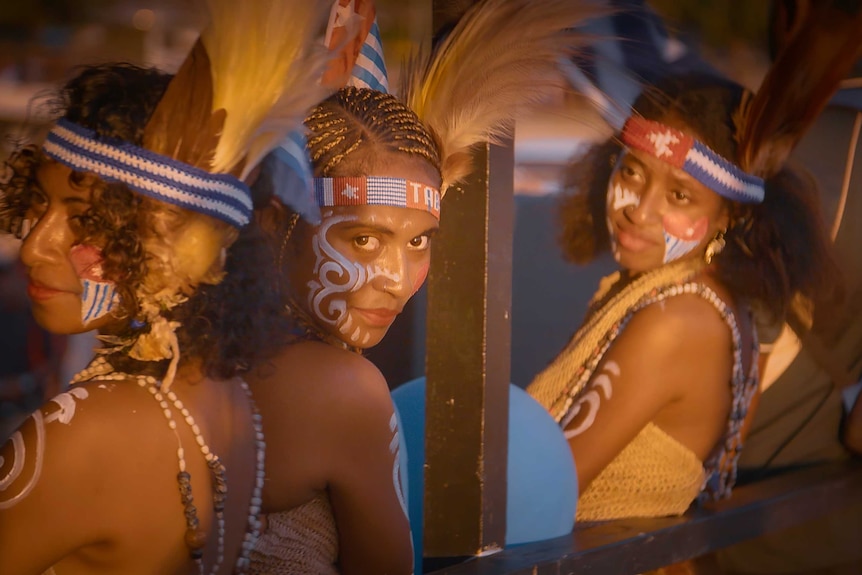
Esther Haluk says land grabs impact West Papuan women more than men. (ABC Foreign Correspondent: Greg Nelson ACS)
Ms Haluk said women were left out of political discourse, especially on issues that directly impacted them.
In 2020, protests erupted in Indonesia over its controversial "omnibus" jobs bill, which made it easier for foreign companies to invest in the country.
It was heavily criticised for undermining workers' rights and weakening environmental protections.
"The omnibus law let the government decide any investment, international or national, to come to West Papua to make a plantation," Ms Haluk said.
"It's putting women off the land because men are selling the land without consulting with women.
A secret war on our doorstep
This is the story that Indonesia doesn't want the world to know. At the height of the uprising, it even cut the internet for an entire region.
"Land grabbing is happening now on customary land. It impacts more on women because women depend more on nature to support [their] families."
Ms Haluk called on the international community to witness the injustice committed in her country.
"The longer we stay in Indonesia, we will vanish. There will not be any Papuans left. We are dying every day. We live in fear," she said.
"As a woman, I have these feelings of protecting life and I will never stop fighting for that. Fighting for the truth and fighting for myself, my identity as a West Papuan."
Men 'pretend you're not there'
Political activist Paula Makabory and her young family were barred from returning to West Papua 16 years ago after she documented human rights abuses.
Ms Makabory — an executive member of the United Liberation Movement for West Papua — has tirelessly advocated for independence, from her Melbourne home, ever since.
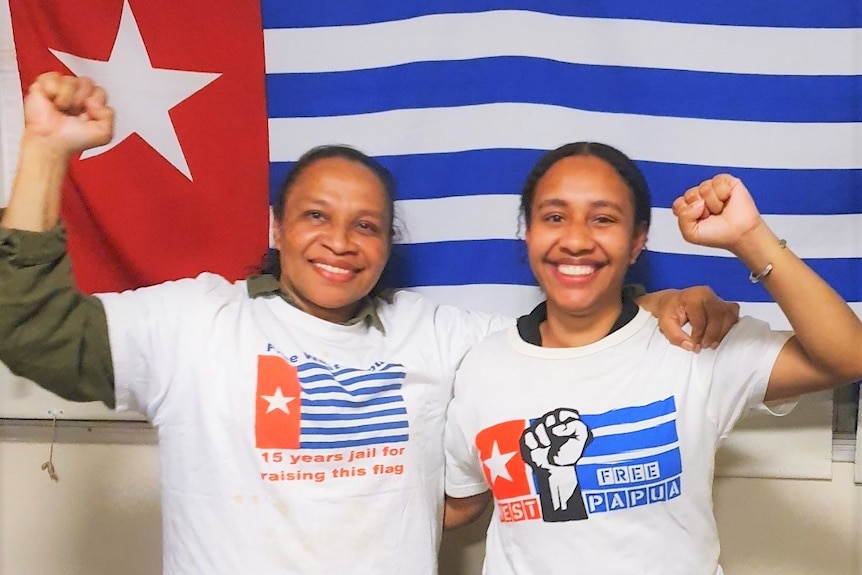
Mother-daughter West Papua Independence duo Paula and Cindy Makabory. (Supplied: Paula Makabory)
However, asserting herself as a leader in a male-dominated movement has proved challenging.
"Sometimes, as a woman, the men surrounding you pretend that you are not there," she said.
"You need to show them, with action and your skill, that you can do things.
"By doing that, you prove yourself and they will realise you are capable – that was a big challenge, especially in leadership among the Pacific Islanders and Melanesian culture."
When the Black Lives Matter movement shook the world in 2020, many people reflected on the systemic racism plaguing the lives of Indigenous peoples in their own countries.
Ms Makabory's daughter, Cindy, took part and is one of a growing number of younger women carrying the torch for West Papuan independence.
"On social media, I see all these young, Indigenous Papuan women standing up and speaking out and not being afraid anymore, which is amazing," she said.
"We have so much power. We make things happen by having women on the front lines telling how it is in their perspective. It's very important."
https://www.abc.net.au/news/2022-03-...nce-/100868936
pelanggaran HAM memang terjadi di Papua oleh TNI dan polisi, tapi sebagian besar keterangannya tendisus seperti pendudukan sekolah dan rumah sakit. Memang ada kasus sekolah jadi pos tentara, tapi sebagian besar dilindungi . Malah sekolah dan rumah sakit dibakar sama KKB karena alasan mereka baru mau bangun sekolah versi mereka setelah merdeka
Australia pemerintannya nggak mau ikut campur , tapi kalau parlemen tergantung.. Bisa jadi kalau pemerintah Australia dikuasai kaum SJW bakal menolak perjanjian Lombok
Seandai Australia intervensi masalah Papua pasti bakal dikerasin sama Indonesia sekarang. Kalau pake skenario Australia invansi Papua dengan bantuan PNG dan Vanuatu lewat justifikasi pembebasan orang Papua lewat dukungan PBB macam NATO nyerang Libia...mungkin ini skenario liar untuk sekarang
On the streets of Perth, almost 4,000 kilometres from West Papua, Wiwince Pigome raises the Morning Star flag.
In doing so, she renews a decades-long push for independence from Indonesia.
Key points:
>West Papuan women exiled in Australia are renewing a push for independence from Indonesia
>West Papua was incorporated into Indonesia in 1962
>Thousands have been killed and displaced amid violent clashes over the past 60 years
Hilda Wayne explores the impact of this violence on the women of West Papua and hears from those leading the fight for independence.
Ms Pigome is one of a number of women who fled overseas in the wake of escalating violence, killings and the widespread displacement of her people.
"I sometimes feel guilty because my people, my family back home is not safe, it is safer with the life that I'm having in Australia," she said.
"[The Indonesian military] is going into war against these poor civilians without arms simply because they want to take over West Papua.
"People have to leave their own home and villages and become refugees in nearby jungles, without any support."
Ms Pigome said people in the eastern Indonesian provinces of Papua and West Papua were living in precarious conditions after the 2018 massacre in Nduga and a violent uprising in Wamena in 2019.
"Military take over our schools, hospitals, community halls and churches and turn them into military bases and [they] burned down all the village houses, killing their animals," she said.
"Many of my family, West Papuans, is living in trauma because of this.
"And then there is no international support or attention, especially when our own people become asylum seekers in in our own homes."
West Papuan women are now empowering themselves and giving a voice to Papuans amid media blackouts.
Life in West Papua
Only 1,025 Papuans voted in the 1969 referendum. Many felt the vote was unjust.
Tensions between Papuans and Indonesia's military have been simmering for 60 years, after the Dutch handed control of West Papua to Indonesia in 1962 before a disputed referendum.
In 1969, a mere 1,025 hand-picked Papuans voted in the United Nations-backed Act of Free Choice poll. Unsurprisingly, the majority chose to remain part of Indonesia.
What followed was a controversial program called Transmigrasi, which involved permanently moving people from densely populated areas of Java to sparsely populated regions such as Papua.
With an aim to reduce poverty in overpopulated cities and exploit the region's natural resources to create jobs, Papuans were marginalised and dispossessed of their traditional lands, which continues to fuel anger over Indonesia's rule today.
And it radically changed the region's demographics, with Papuans being a minority group in several areas, outnumbered mostly by Javanese Indonesians.
The Indonesian provinces of West Papua and Papua. (ABC News: Jarrod Fankhauser)
'We can't keep silent'
Over the past 60 years, calls for independence have had deadly consequences.
Australia has been hesitant to intervene in West Papua's human rights crisis, mainly due to its relationship with Indonesia.
In 2006, Australia signed the Lombok Treaty, which recognised Indonesia's territorial sovereignty over the region and involved a commitment by both countries to not support "groups encouraging separatism".

It is estimated that between 100,000 and 500,000 people have been killed in violent clashes between pro-independence groups and Indonesian security forces and up to 100,000 have been internally displaced.
That's a number Indonesia disputes, suggesting only 2,000 have fled.
Amid the brutality, West Papuan women lost loved ones, land and livelihoods.
"For goodness sakes, my grandfather fight for this Australian nation back in World War II," Ms Pigome said.
"Now I'm asking the Australian government to help my people to be free from torture, inhumane killing — my people are dying. We can't keep silent about it."
In a response to questions from the ABC in 2020,Indonesia denied its military had committed human rights abuses and defended its operations in the provinces.
"[We are] a professional military organisation under [a] strict code of conduct and rules of procedures in conducting operations, including an obligation to respect and promote human rights," the statement said.
"Human rights principles have also been incorporated in the rules of engagement."
The Indonesian embassy in Canberra has been contacted for comment.
Structural, societal oppression
West Papuan women's rights advocate Esther Haluk said women faced "layers of violence", both in society and in matters of public policy as well as in decision-making over resource-rich lands.
"We face structural violence because of the many policies implemented in West Papua," she said.
"[Indonesia's] development policy racialised us, because we are considered a backward, Stone Age society. So they try to decide what is best for us since we became a part of Indonesia."
Esther Haluk says land grabs impact West Papuan women more than men. (ABC Foreign Correspondent: Greg Nelson ACS)
Ms Haluk said women were left out of political discourse, especially on issues that directly impacted them.
In 2020, protests erupted in Indonesia over its controversial "omnibus" jobs bill, which made it easier for foreign companies to invest in the country.
It was heavily criticised for undermining workers' rights and weakening environmental protections.
"The omnibus law let the government decide any investment, international or national, to come to West Papua to make a plantation," Ms Haluk said.
"It's putting women off the land because men are selling the land without consulting with women.
A secret war on our doorstep
This is the story that Indonesia doesn't want the world to know. At the height of the uprising, it even cut the internet for an entire region.
"Land grabbing is happening now on customary land. It impacts more on women because women depend more on nature to support [their] families."
Ms Haluk called on the international community to witness the injustice committed in her country.
"The longer we stay in Indonesia, we will vanish. There will not be any Papuans left. We are dying every day. We live in fear," she said.
"As a woman, I have these feelings of protecting life and I will never stop fighting for that. Fighting for the truth and fighting for myself, my identity as a West Papuan."
Men 'pretend you're not there'
Political activist Paula Makabory and her young family were barred from returning to West Papua 16 years ago after she documented human rights abuses.
Ms Makabory — an executive member of the United Liberation Movement for West Papua — has tirelessly advocated for independence, from her Melbourne home, ever since.
Mother-daughter West Papua Independence duo Paula and Cindy Makabory. (Supplied: Paula Makabory)
However, asserting herself as a leader in a male-dominated movement has proved challenging.
"Sometimes, as a woman, the men surrounding you pretend that you are not there," she said.
"You need to show them, with action and your skill, that you can do things.
"By doing that, you prove yourself and they will realise you are capable – that was a big challenge, especially in leadership among the Pacific Islanders and Melanesian culture."
When the Black Lives Matter movement shook the world in 2020, many people reflected on the systemic racism plaguing the lives of Indigenous peoples in their own countries.
Ms Makabory's daughter, Cindy, took part and is one of a growing number of younger women carrying the torch for West Papuan independence.
"On social media, I see all these young, Indigenous Papuan women standing up and speaking out and not being afraid anymore, which is amazing," she said.
"We have so much power. We make things happen by having women on the front lines telling how it is in their perspective. It's very important."
https://www.abc.net.au/news/2022-03-...nce-/100868936
pelanggaran HAM memang terjadi di Papua oleh TNI dan polisi, tapi sebagian besar keterangannya tendisus seperti pendudukan sekolah dan rumah sakit. Memang ada kasus sekolah jadi pos tentara, tapi sebagian besar dilindungi . Malah sekolah dan rumah sakit dibakar sama KKB karena alasan mereka baru mau bangun sekolah versi mereka setelah merdeka

Australia pemerintannya nggak mau ikut campur , tapi kalau parlemen tergantung.. Bisa jadi kalau pemerintah Australia dikuasai kaum SJW bakal menolak perjanjian Lombok
Seandai Australia intervensi masalah Papua pasti bakal dikerasin sama Indonesia sekarang. Kalau pake skenario Australia invansi Papua dengan bantuan PNG dan Vanuatu lewat justifikasi pembebasan orang Papua lewat dukungan PBB macam NATO nyerang Libia...mungkin ini skenario liar untuk sekarang
muhamad.hanif.2 dan 3 lainnya memberi reputasi
0
911
9
Komentar yang asik ya
Urutan
Terbaru
Terlama
Komentar yang asik ya
Komunitas Pilihan